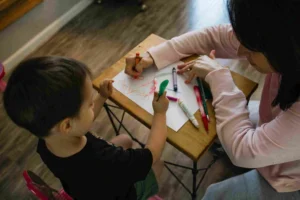The Importance of Early Childhood Educators in Child Development
In the ever-evolving narrative of early childhood development, there’s a central character often overlooked by many: early childhood educators. They are the unsung heroes in a child’s growth journey, the architects of a future yet to be fully realized. The importance of early childhood educators cannot be overstated, for they hold the keys to unlocking a child’s potential, nurturing the seeds of curiosity, and igniting the flames of lifelong learning.
As we explore the importance of early childhood educators in shaping young minds, we’ll uncover their vital role in building our society’s future, one child at a time. So, let’s embark on this journey to understand why early childhood educators are indispensable in early education.
Key Takeaways:
- The importance of early childhood educators lies in their ability to foster cognitive, social, emotional, and physical development in young children.
- Early childhood educators create inclusive environments that encourage learning and curiosity.
- They play a pivotal role in developing children’s language, communication, and physical skills, which are crucial for future success.
- Early childhood educators prepare children for formal education, ensuring a smooth transition and a solid foundation for academic success.
The Role of Early Childhood Educators in Child Development

Early childhood educators play a crucial role in child development, offering much more than just academic instruction. They create nurturing and inclusive environments where children feel safe and encouraged to explore. These educators foster social and emotional growth by modeling positive interactions and teaching emotional regulation. They also stimulate cognitive development through age-appropriate learning activities that promote a lifelong love of learning.
The qualities of a preschool teacher include respecting each child’s uniqueness, accommodating diverse learning styles, and pacing. They encourage creativity and critical thinking through open-ended activities and foster collaboration with parents, maintaining open communication to support a child’s development both at school and at home. Patience and empathy are fundamental qualities that enable them to navigate the diverse personalities and developmental stages they encounter, ensuring a positive and nurturing educational experience for every child. In essence, preschool teachers are the architects of early childhood development, laying the foundation for a child’s future success in school and life.
Why the Importance of Early Childhood Educators Cannot Be Overlooked

The importance of early childhood educators cannot be emphasized enough. These professionals guide children through some of their most crucial developmental years, laying the groundwork for cognitive, social, emotional, and physical growth. Their dedication shapes the future success of their students, making them integral to early childhood education.
By creating environments where children feel valued and supported, early childhood educators ensure that children develop the social and emotional skills necessary for life. This is why their role is indispensable in fostering a generation of confident, capable individuals.
Social and Emotional Development: A Core Responsibility of Early Childhood Educators
Preschool is a critical stage for both cognitive growth and the development of social and emotional skills. In a structured setting, children engage with peers, build relationships, and develop conflict-resolution skills under the guidance of early childhood educators. Their role is essential in helping children navigate their emotions and learn how to interact socially. This is where the importance of early childhood educators truly shines.
The Role of Preschool in Fostering Social Skills
- Structured Social Interaction: Preschool provides a structured setting for children to engage with peers, promoting socialization and cooperation.
- Building Relationships: Preschool environments encourage the formation of friendships, teaching children the foundations of building and maintaining relationships.
- Conflict Resolution: Children learn valuable conflict resolution skills as they navigate disagreements with peers under the guidance of preschool teachers.
- Cultural Awareness: Exposure to diverse backgrounds and experiences in preschool helps children develop cultural sensitivity and empathy.
Emotional Regulation and Preschool Teacher’s Impact
- Modeling Emotion Management: Preschool teachers serve as role models for emotional regulation, demonstrating how to express feelings appropriately.
- Providing a Safe Space: Preschools offer a secure environment where children can explore their emotions and learn to manage them constructively.
- Teaching Coping Strategies: Teachers help children develop coping strategies for handling stress, frustration, and anxiety, which are essential life skills.
- Encouraging Empathy: Through storytelling and activities, teachers nurture empathy, helping children understand and respond to others’ feelings.
Language and Communication Skills: Shaped by Early Childhood Educators
In the early years, language and communication skills form the foundation for a child’s academic success and social interactions. The importance of early childhood educators is evident in how they create language-rich environments through reading, storytelling, and discussions, which help expand children’s vocabularies and enhance their communication abilities. These skills are crucial for social interactions and future academic achievements, making the role of these educators irreplaceable.
Importance of Language Development in Early Childhood
- Gateway to Learning: Language is the key to accessing knowledge, making early language development crucial for future educational achievement.
- Communication and Expression: Language empowers children to express their thoughts, emotions, and needs, fostering effective communication.
- Social Interaction: Proficient language skills facilitate socialization, enabling children to build friendships and engage with peers and adults.
- Cognitive Growth: Language development is intertwined with cognitive growth, enhancing problem-solving, memory, and critical thinking.
How Preschool Teachers Enhance Language and Communication Skills
- Rich Language Environment: Preschool classrooms are rich in language-rich activities, including reading, storytelling, and discussions, fostering language acquisition.
- Vocabulary Expansion: Teachers introduce new words and concepts, expanding children’s vocabulary and comprehension.
- Encouraging Expression: Preschool teachers create an environment where children feel encouraged to express themselves through speech, art, and dramatic play.
- Effective Communication Models: Teachers model effective communication, teaching children how to listen actively and respond appropriately.
- Individualized Support: Skilled preschool educators recognize individual language development needs and provide tailored support to children who may require additional assistance.
Physical Development: Nurtured by Early Childhood Educators

Early childhood educators are important in promoting physical development by encouraging children to engage in activities that enhance gross and fine motor skills. Through outdoor play, arts and crafts, and physical education activities, children develop essential physical abilities that are critical for overall health and cognitive function.
Physical Milestones in Early Childhood
- Gross Motor Skills: Early childhood is marked by the development of gross motor skills, such as crawling, standing, and walking, which contribute to a child’s mobility and independence.
- Fine Motor Skills: As children grow, they refine their fine motor skills, enabling them to perform tasks like grasping small objects, drawing, and writing.
- Coordination: The development of hand-eye coordination is essential for activities that require precision, such as catching a ball or threading beads.
- Muscle Strength and Endurance: Physical milestones include the gradual strengthening of muscles and the development of endurance, allowing children to engage in sustained physical activities.
- Spatial Awareness: Children also develop spatial awareness, which helps them navigate their environment and understand concepts like distance and direction.
Preschool Activities Promoting Physical Development
- Outdoor Play: Preschools often incorporate outdoor playtime, where children can run, jump, climb, and engage in activities that enhance gross motor skills.
- Arts and Crafts: Fine motor skills are honed through arts and crafts projects that involve cutting, drawing, and manipulating small objects.
- Dance and Movement: Preschools may offer dance and movement activities that encourage coordination and rhythm.
- Sports and Games: Sports and games, such as soccer, tag, and relay races, promote physical fitness and teamwork.
- Yoga and Stretching: Some preschools introduce yoga and stretching exercises to improve flexibility and balance.
- Nutrition Education: Preschools often educate children about healthy eating habits, reinforcing the importance of proper nutrition for physical growth.
The Connection Between Physical Health and Cognitive Development
- Enhanced Brain Function: Regular physical activity is linked to improved blood flow to the brain, which enhances cognitive function, including memory, attention, and problem-solving.
- Stress Reduction: Physical activity reduces stress and anxiety, creating a positive emotional state that supports cognitive development.
- Improved Concentration: Children who engage in physical activities tend to exhibit better concentration and focus in academic tasks.
- Better Sleep: Physical activity promotes better sleep quality, crucial for cognitive consolidation and learning.
- Healthy Lifestyle Habits: Preschools play a pivotal role in instilling healthy lifestyle habits, including physical activity and balanced nutrition, which contribute to overall well-being.
Preparing Children for Formal Education: The Role of Early Childhood Educators
As children transition from preschool to primary school, early childhood educators play an essential role in preparing them for formal education. They teach children foundational literacy and numeracy skills, foster social and emotional readiness, and introduce routines that mirror those of primary school. The importance of early childhood educators is especially apparent here, as they lay the foundation for long-term academic success.
The Transition from Preschool to Primary School
- Social and Emotional Readiness: Preschools focus on preparing children emotionally for the transition, helping them develop the social skills and confidence needed to navigate a new school environment.
- Familiarizing with Routines: Children are introduced to structured routines and schedules in preschool, mirroring those of primary school, to ease the adjustment process.
- Orientation Programs: Many preschools collaborate with local primary schools to offer orientation programs, giving children a glimpse of their future school and teachers.
- Parent Involvement: Communication between preschools and parents is vital, ensuring that families are well-informed and can actively support their child’s transition.
Academic Readiness and Preschool Curriculum
- Literacy and Numeracy Skills: Preschools introduce foundational literacy and numeracy concepts through play-based activities, setting the stage for more formal instruction in primary school.
- Early Exposure to STEM: Some preschools incorporate STEM (Science, Technology, Engineering, and Mathematics) activities to spark curiosity and critical thinking.
- Creativity and Critical Thinking: Preschools emphasize creativity and problem-solving, encouraging children to think independently and develop a love for learning.
- Cultural Awareness: Preschools often introduce cultural diversity, fostering acceptance and understanding among children.
- Fine Motor Skills: Activities that promote fine motor skills, like coloring and puzzles, prepare children for tasks such as writing and drawing in primary school.
Long-Term Benefits of a Strong Preschool Foundation
- Academic Success: A strong preschool foundation can lead to better academic performance throughout a child’s school years.
- Enhanced Social Skills: Children who attend preschool often exhibit stronger social skills, making it easier for them to form friendships and collaborate with peers in primary school.
- Confidence and Independence: Preschool fosters confidence and independence, qualities that contribute to a child’s readiness to take on new challenges in primary school.
- Love for Learning: A positive preschool experience can instil a lifelong love for learning and curiosity about the world.
- Reduced Achievement Gap: High-quality preschool programs can help reduce educational disparities and the achievement gap, particularly among children from disadvantaged backgrounds.
Conclusion: Understanding the Importance of Early Childhood Educators
In conclusion, the importance of early childhood educators in a child’s development cannot be understated. Their influence spans across cognitive, social, emotional, and physical growth, laying the foundation for future success. By recognizing the importance of early childhood educators, we invest in a brighter, more capable generation of learners who are equipped to make a positive impact on the world.









